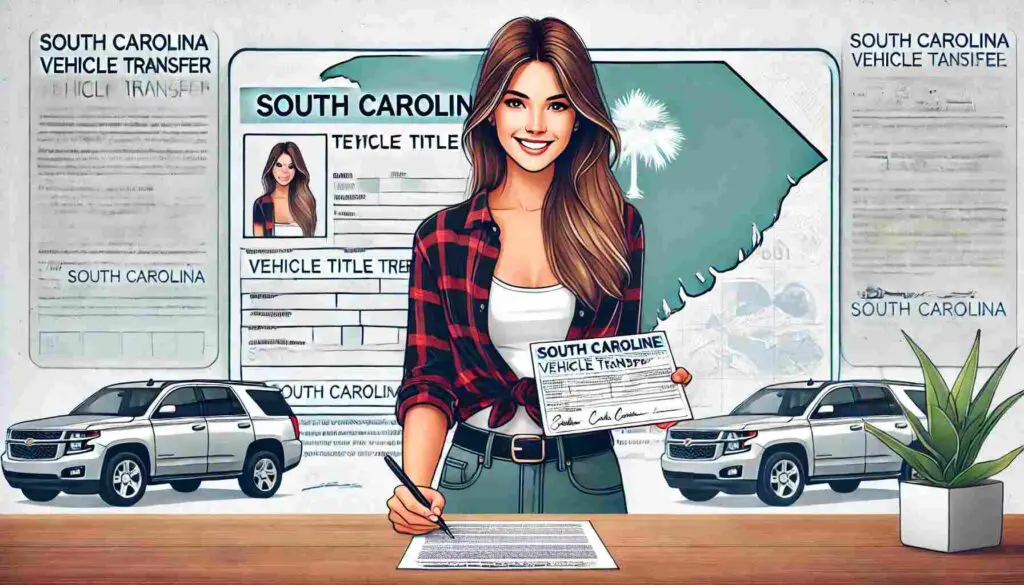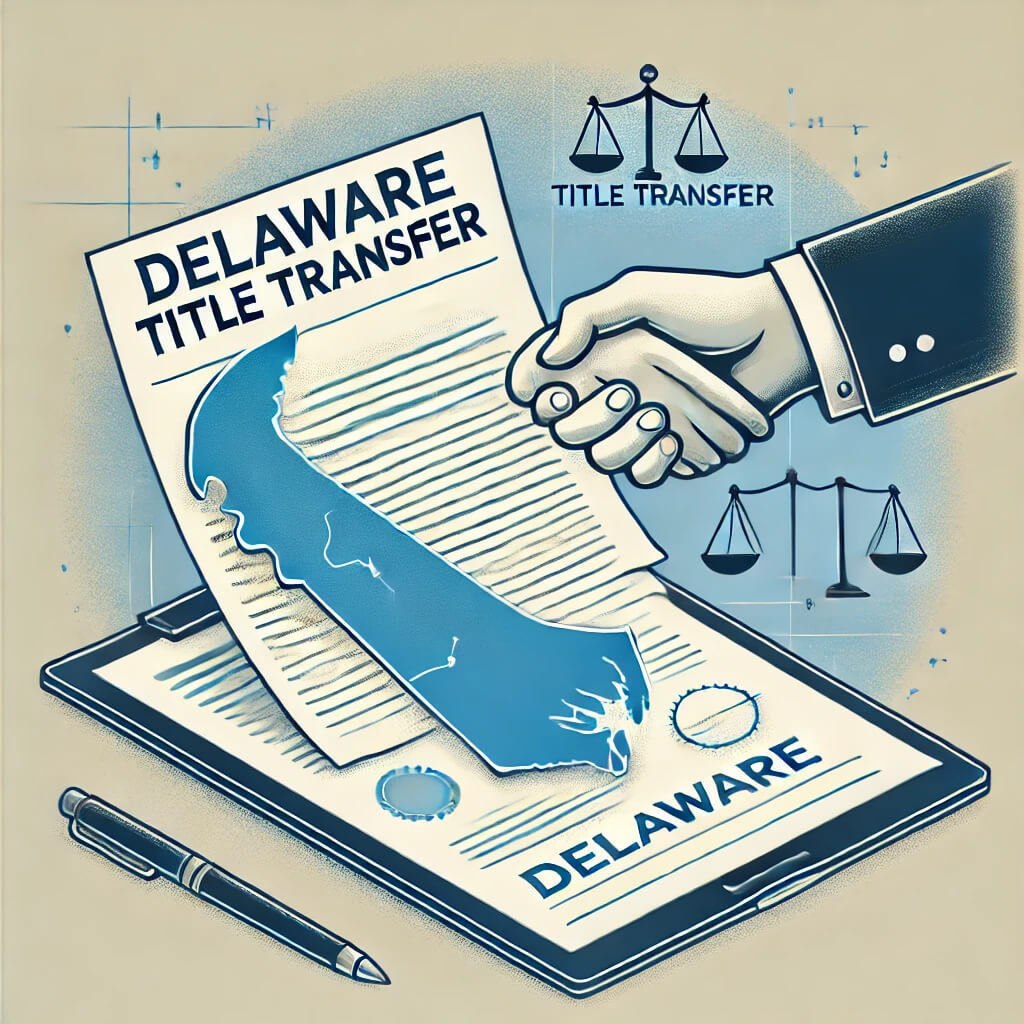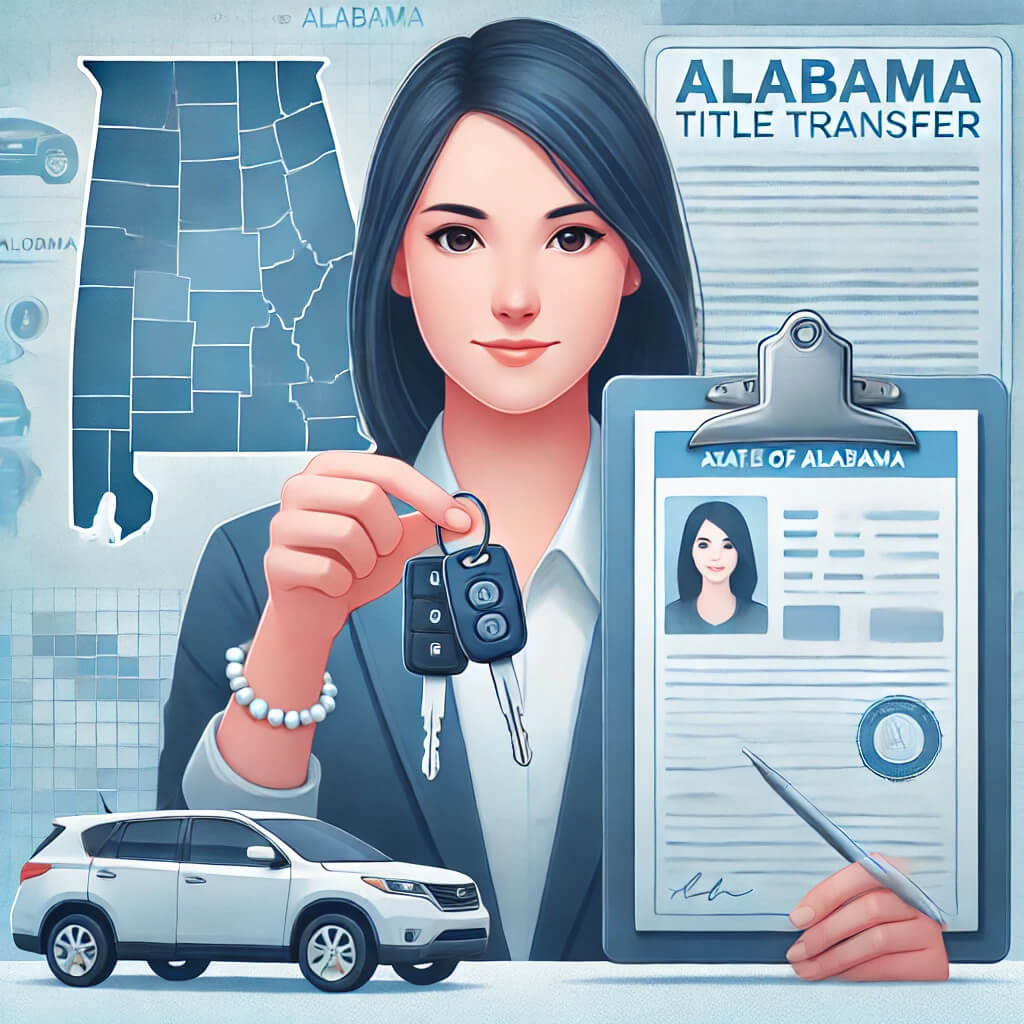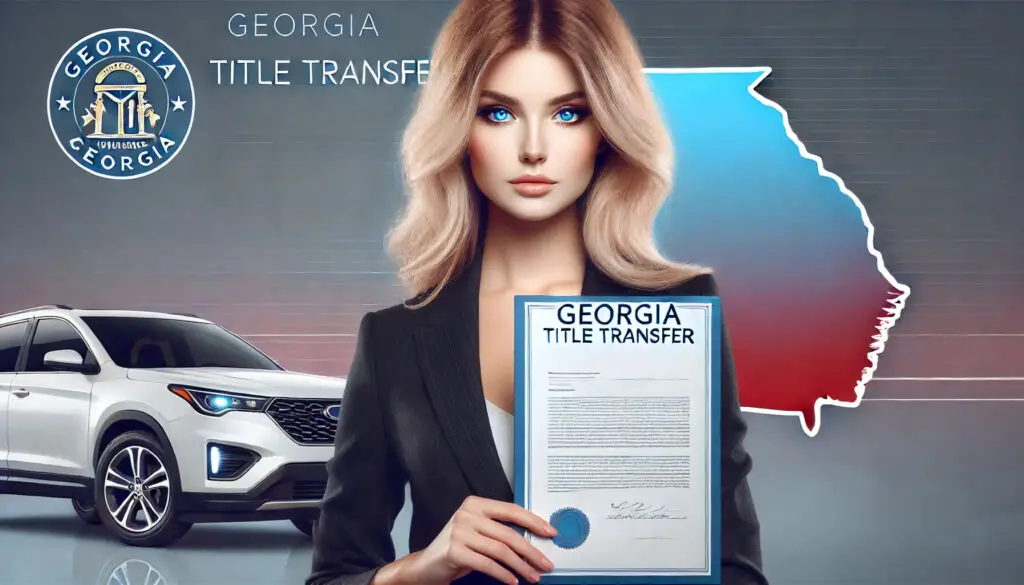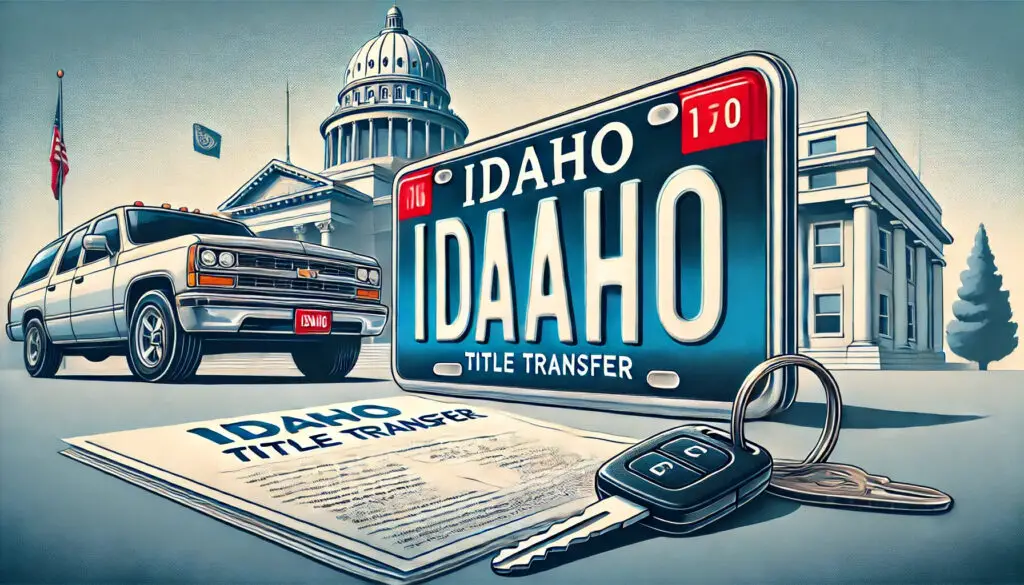Transferring a vehicle title in South Carolina is a critical process when buying, selling, gifting, or inheriting a vehicle. Failing to complete the title transfer correctly can lead to legal issues, ownership disputes, and potential financial consequences. This guide walks you through everything you need to know about vehicle title transfers in South Carolina, ensuring compliance with state laws and a seamless ownership change.
1. Introduction
Understanding the vehicle title transfer process is essential for anyone buying or selling a vehicle in South Carolina. The title transfer legally documents the change of ownership, protecting both the buyer and seller. This guide covers the steps, requirements, and important tips for a successful title transfer.
2. What is a Vehicle Title Transfer in South Carolina?
A vehicle title transfer is the process of officially transferring ownership of a vehicle from one person to another. It is a legal requirement to ensure the new owner has proof of ownership.
Purpose of a Title Transfer
- Establishes the buyer’s legal ownership of the vehicle.
- Ensures the seller is no longer liable for the vehicle.
Common Scenarios Requiring a Title Transfer
- Sale of a vehicle.
- Gift transfer.
- Inheritance of a vehicle.
- Lien release.
3. Why is Title Transfer Important in South Carolina?
A title transfer is more than just a bureaucratic step—it safeguards all parties involved.
Key Reasons to Transfer the Title
- Legal Proof of Ownership: Prevents disputes about who owns the vehicle.
- Fraud Prevention: Ensures accurate records of ownership changes.
- Compliance with Laws: Avoids penalties for non-compliance with state regulations.
4. When Do You Need to Transfer a Vehicle Title?
You must transfer the title in South Carolina in the following situations:
- Selling a vehicle.
- Gifting a vehicle to a family member or friend.
- Inheriting a vehicle after the owner’s death.
- Clearing a lien from the vehicle’s title.
5. Required Documents for a Vehicle Title Transfer in South Carolina
To complete the title transfer, gather the following:
- Completed Title Application (SCDMV Form 400).
- Statement of Vehicle Operation (SCDMV Form TI-006) if required.
- Signed original title from the seller.
- Bill of Sale with purchase details.
- Proof of Identification (driver’s license or state ID).
- Proof of Insurance.
- Payment for title and registration fees.
6. How to Transfer a Vehicle Title in South Carolina
Step-by-Step Guide
- Gather Required Documents: Ensure all necessary forms and documents are ready.
- Complete the Title Application: Fill out SCDMV Form 400 accurately.
- Prepare the Statement of Vehicle Operation: If the vehicle is inoperable, fill out SCDMV Form TI-006.
- Visit a Local DMV Office: Submit your documents in person.
- Pay Fees: Title transfer and registration fees vary.
- Receive Your New Title: The DMV will process and issue a new title.
7. What is a Bill of Sale and Why is it Important?
A Bill of Sale is a vital document in the vehicle title transfer process. It acts as a receipt and provides a detailed record of the transaction between the buyer and the seller. While not always legally mandated in South Carolina, a Bill of Sale is often required and strongly recommended for protecting both parties in the transaction.
Purpose of a Bill of Sale
- Proof of Transaction:
- Documents the transfer of ownership, ensuring that both parties have a formal record of the agreement.
- Acts as evidence in the event of disputes over the vehicle’s ownership, condition, or sale terms.
- Legal Protection:
- Shields the seller from liability for any incidents involving the vehicle after the sale.
- Offers the buyer a record of sale details, which is often required for titling and registration.
- Compliance:
- The South Carolina Department of Motor Vehicles (SCDMV) often requires a Bill of Sale for certain transactions, such as when the sale price needs to be verified for tax purposes.
Key Details to Include in a Bill of Sale
To ensure the Bill of Sale is complete and legally valid, it must include the following details:
- Vehicle Information:
- Vehicle Identification Number (VIN).
- Make, model, and year of the vehicle.
- Transaction Details:
- Sale price of the vehicle.
- Date of the transaction.
- Buyer and Seller Information:
- Full names and addresses of both parties.
- Contact information for follow-up if needed.
- Signatures:
- Both the buyer and seller must sign the document.
- In some cases, notarization may be required for added legal validation.
When is a Bill of Sale Required?
The Bill of Sale is particularly important in the following situations:
- Private Sales: Ensures clear documentation of the agreed terms between private individuals.
- Tax Verification: Helps the SCDMV determine the correct amount of taxes due based on the sale price.
- Gifted Vehicles: Confirms that the vehicle was transferred as a gift and not sold, preventing tax disputes.
Why the Bill of Sale Matters
Without a Bill of Sale, disputes about the sale terms, vehicle condition, or ownership can arise, leading to complications in the title transfer process. For instance:
- If the buyer claims they paid less than the agreed amount, the seller can reference the Bill of Sale as proof of the agreed sale price.
- If the seller is contacted about incidents involving the vehicle after the sale, the Bill of Sale proves that ownership was transferred.
Best Practices When Creating a Bill of Sale
- Use a Template:
- The South Carolina DMV provides templates or examples to ensure compliance with state regulations.
- Alternatively, you can draft your own, ensuring it includes all required details.
- Keep Copies:
- Both the buyer and seller should retain a copy of the signed Bill of Sale for their records.
- Notarize (if Necessary):
- For added legal protection, consider notarizing the Bill of Sale, especially for high-value vehicles or contested transactions.
8. Do You Need to Submit an Odometer Disclosure Statement?
9. How to Handle Lien Releases During Title Transfer
A lien is a legal claim on a vehicle that serves as collateral for a loan or debt. If the vehicle you’re transferring has an active lien, the lien must be resolved before the title transfer can be completed in South Carolina.
What is a Lien Release?
A lien release is a document provided by the lienholder (usually a bank or financial institution) indicating that the loan or debt tied to the vehicle has been fully paid off. This document is required to clear the lien from the title, allowing you to transfer full ownership to the buyer.
Why is a Lien Release Necessary?
- Clear Ownership:
- A vehicle with an active lien cannot be legally sold or transferred without the lienholder’s consent.
- The lienholder is considered a co-owner until the lien is cleared.
- Legal Compliance:
- South Carolina law requires the lien to be removed from the title before the vehicle can be sold or transferred.
- Avoid Complications:
- Failing to clear the lien can delay the title transfer process and lead to disputes between buyers and sellers.
Steps to Obtain a Lien Release
If the vehicle has a lien, follow these steps to obtain a lien release:
1. Confirm the Loan is Paid in Full
- Verify with the lienholder that all payments have been made and that no balance remains.
2. Request the Lien Release Document
- Contact the lienholder and request a Lien Satisfaction Letter or Release of Lien. Most financial institutions provide this upon loan payoff.
- Ensure the release includes:
- Vehicle Identification Number (VIN).
- Vehicle make, model, and year.
- The lienholder’s signature and official stamp.
3. Submit the Lien Release to the DMV
- Once you receive the lien release document, bring it to the South Carolina Department of Motor Vehicles (SCDMV) along with the title.
- The DMV will issue a clear title (free of liens) in the name of the vehicle owner.
4. Notify the Buyer
- If you are selling the vehicle, inform the buyer that the lien has been cleared and provide them with the updated title.
Special Cases
- Electronic Lien Releases:
- Some lienholders use electronic systems to notify the DMV directly when a lien is satisfied. Check with your lender to see if this applies.
- Lost Lien Release Documents:
- If the lien release document is lost, contact the lienholder to request a duplicate. Additional verification may be required.
- Lienholder Unavailability:
- If the lienholder is no longer in business, consult the DMV for guidance on how to clear the lien. You may need to provide additional proof of loan payoff.
Tips for a Smooth Lien Release Process
- Act Promptly: Request the lien release as soon as the loan is paid off to avoid delays during the title transfer.
- Verify Accuracy: Ensure all details on the lien release document are correct, including the VIN and vehicle details.
- Keep Copies: Retain a copy of the lien release for your records, even after the lien is cleared.
Why Clearing the Lien Matters
Clearing the lien is essential for transferring ownership and ensuring that the buyer receives a clean title. It protects both parties from legal complications and establishes clear, uncontested ownership of the vehicle.
By handling the lien release process diligently, you can ensure a hassle-free title transfer and maintain trust between all parties involved.
10. Do You Need a Vehicle Inspection for Title Transfer in South Carolina?
Inspection Requirements
- Not typically required unless the vehicle is newly registered from another state or flagged for safety concerns.
11. Fees Associated with Vehicle Title Transfer in South Carolina
Typical Costs
When transferring a vehicle title in South Carolina, you should be aware of the various fees associated with the process. These costs can vary depending on factors such as the vehicle’s type, sale price, and registration requirements. Understanding these fees in advance can help you budget appropriately and avoid unexpected expenses.
1. Title Transfer Fee
- The standard fee for transferring a vehicle title in South Carolina is $15.
- This fee covers the administrative cost of processing the ownership change and issuing a new title in the buyer’s name.
2. Registration Fees
- If the buyer also needs to register the vehicle at the time of title transfer, additional registration fees apply.
- Passenger Vehicle Registration:
- Standard vehicles: $40.
- Senior citizens (age 65+): $38.
- Motorcycles: $10.
3. Infrastructure Maintenance Fee (IMF)
- For most vehicle purchases, South Carolina charges an Infrastructure Maintenance Fee (IMF) in place of sales tax.
- The IMF is calculated as 5% of the vehicle’s sale price, with a maximum cap of $500.
- Example: For a $10,000 vehicle, the IMF would be $500 (since 5% of $10,000 exceeds the cap).
4. Additional Costs
- License Plate Fee: If the buyer needs new plates, there is an additional charge (varies depending on the plate type).
- Temporary Tag Fee: If temporary tags are required, there is a separate fee for issuance.
- Lien Recording Fee: If a lien is being added to the title (e.g., for a vehicle loan), there is a lien recording fee of $10.
Payment Options
- Accepted Payment Methods: Most SCDMV offices accept cash, check, and major credit or debit cards. Verify accepted methods at your local DMV office before visiting.
- Online Payments: Some fees, like renewal charges or certain title applications, can be paid online via the SCDMV website.
How to Minimize Costs
- Complete the Title Transfer Within 45 Days:
- Avoid late fees by ensuring the title transfer is completed on time.
- Verify IMF Eligibility:
- Vehicles gifted to family members or transferred in inheritance may be exempt from the Infrastructure Maintenance Fee.
- Consider Plate Transfers:
- If you’re transferring an existing license plate from another vehicle, you can avoid paying for new plates.
Consequences of Non-Payment
- Failing to pay the required fees will delay the issuance of the new title, making it illegal for the buyer to operate or sell the vehicle.
- Penalties may also apply for late payment of registration or title transfer fees.
By understanding and preparing for these fees, you can ensure a smooth and hassle-free title transfer process in South Carolina.
12. Temporary Tags During the Title Transfer Process
13. Timeframe for Completing a Title Transfer in South Carolina
Typical Timeline
The process usually takes 7–14 business days. Delays can result in penalties or legal issues.
14. Can You Transfer a Vehicle Title Online in South Carolina?
Online Title Transfer
- Some title transfer steps can be completed online through the SCDMV website.
- Pros: Convenience and faster processing.
- Cons: Not available for all scenarios.
15. Common Problems and Solutions During Title Transfer
Issues and Fixes
The vehicle title transfer process in South Carolina involves multiple steps and requirements. Missing information, errors, or unavailability of key parties can cause delays or complications. Here are some common problems you might encounter during a title transfer and practical solutions to resolve them.
1. Missing Documents
The Problem:
Missing or incomplete paperwork is one of the most frequent issues during title transfers. Essential documents like the signed title, Bill of Sale, or proof of insurance may be overlooked.
The Fix:
- Verify Document Requirements: Use a checklist to ensure all required forms and documents are collected, such as:
- Completed SCDMV Form 400.
- Signed vehicle title with odometer disclosure.
- Bill of Sale, proof of insurance, and proof of identity.
- Double-Check Completeness: Ensure forms are fully completed, legible, and signed by all necessary parties.
- Retrieve Missing Documents Promptly: If you realize something is missing, contact the relevant party (seller, buyer, or lienholder) immediately to obtain the required paperwork.
2. Odometer Discrepancies
The Problem:
Discrepancies in odometer readings can raise red flags during the title transfer process. This issue often occurs due to typos, incorrect entries, or intentional odometer fraud.
The Fix:
- Double-Check the Reading: Verify the odometer reading on the vehicle matches what is recorded on the title and disclosure form.
- Correct Errors Before Submission: If a mistake is found, ensure the correction is made on the title or disclosure form before submitting it to the DMV.
- Suspected Fraud: If fraud is suspected, report the issue to the South Carolina DMV and consider consulting legal advice.
3. Seller Unavailability
The Problem:
The seller is unavailable to sign the title or provide necessary documentation, which can stall the transfer process.
The Fix:
- Contact the Seller: Make every effort to reach the seller via phone, email, or mail.
- Legal Steps:
- If the seller is unreachable or uncooperative, consider legal actions, such as filing for a bonded title. This process allows buyers to obtain a title when the seller is unavailable, but it requires proof of the transaction and a bond for financial protection.
- Contact the South Carolina DMV for guidance on the bonded title process.
- Prevent Future Issues: Buyers should always ensure that the seller provides all necessary documents and signatures at the time of the transaction.
4. Errors on the Title
The Problem:
Errors on the title, such as misspelled names, incorrect VINs, or mismatched information, can delay the transfer.
The Fix:
- Review the Title: Both the buyer and seller should carefully review the title before signing to ensure all details are accurate.
- Correct Errors with the DMV: Minor errors can often be corrected by submitting the title to the DMV along with a correction form. Significant issues may require additional documentation or a duplicate title request.
5. Issues with Lienholders
The Problem:
An active lien on the vehicle title prevents the transfer of full ownership.
The Fix:
- Obtain a Lien Release: Ensure the lienholder provides a lien release document and submits it to the DMV.
- Electronic Lien Releases: Verify if the lienholder can release the lien electronically to expedite the process.
- Clearing Old Liens: If the lienholder is no longer in business, consult the DMV for steps to clear the lien.
6. Delays in DMV Processing
The Problem:
DMV processing times can vary, causing delays in completing the title transfer.
The Fix:
- Plan Ahead: Visit the DMV during non-peak hours and ensure all documents are prepared to avoid additional trips.
- Consider Online Services: Check if any part of the process can be completed online through the South Carolina DMV’s website.
- Follow Up: If the process takes longer than expected, follow up with the DMV to inquire about the status of the title transfer.
7. Lost or Damaged Title
The Problem:
The original vehicle title is lost, damaged, or otherwise unavailable.
The Fix:
- Request a Duplicate Title: Use SCDMV Form 400 to apply for a duplicate title. The request must come from the current titleholder or lienholder.
- Allow Processing Time: Duplicate titles may take several days to weeks to process, so plan accordingly.
Tips to Avoid Common Problems
- Prepare in Advance: Gather all required documents before beginning the transfer process.
- Verify Information: Double-check every form and document for accuracy and completeness.
- Communicate Clearly: Maintain clear communication with the other party involved in the transaction (buyer or seller).
- Consult the DMV: For complex issues, consult the South Carolina DMV for guidance.
By anticipating and addressing these common problems, you can navigate the title transfer process in South Carolina efficiently and with minimal stress.
16. How to Transfer a Vehicle Title When the Seller is Deceased
Required Steps
- Provide the death certificate.
- Submit proof of inheritance or a court order.
17. What to Do if the Title is Lost or Damaged?
Steps for a Duplicate Title
- Fill out SCDMV Form 400 for a replacement.
- Submit proof of ownership.
18. Frequently Asked Questions (FAQs)
What Happens if I Don’t Transfer the Title in 45 Days?
Failing to transfer the title within the required 45 days after a vehicle sale or ownership change can lead to significant consequences in South Carolina.
Consequences of Missing the 45-Day Deadline
- Penalties:
- Late fees may be assessed for delayed title transfers. These fees increase the longer you wait.
- Legal Issues:
- The seller could still be listed as the vehicle’s owner in the state’s records, making them potentially liable for fines, accidents, or violations involving the vehicle.
- Transaction Complications:
- The buyer may face difficulties registering or insuring the vehicle without a timely title transfer.
What to Do if You Miss the Deadline
- Visit your local South Carolina DMV office as soon as possible to complete the title transfer.
- Be prepared to pay any applicable late fees.
- Explain your situation to DMV staff, as they may guide you through additional steps if required.
Is a Notary Required for Title Transfer in South Carolina?
Yes, notarization is required in certain circumstances to validate the title transfer process in South Carolina. This ensures that the signatures on critical documents are authentic and legally binding.
When is Notarization Required?
- Signatures on the Title:
- The title must often be notarized when the seller signs it to transfer ownership to the buyer.
- Odometer Disclosure:
- Some odometer disclosure statements may require notarization, especially in private sales.
- Bill of Sale (in Some Cases):
- While not always required, notarization of the Bill of Sale can provide extra legal protection for both parties.
How to Notarize Documents
- Visit a licensed notary public with the required documents (title, Bill of Sale, etc.).
- Both parties (buyer and seller) should be present with valid identification.
- The notary will witness the signatures and affix their seal to validate the documents.
Why Notarization is Important
- Prevents fraud and forgery.
- Adds an extra layer of legal protection for both the buyer and the seller.
- Ensures compliance with South Carolina’s DMV requirements.
Key Tips for Addressing FAQs
- Act Promptly: Always complete the title transfer within the 45-day period to avoid unnecessary complications or costs.
- Confirm Notary Requirements: Check with the DMV or consult the title itself to determine if notarization is required for your specific transaction.
Understanding these aspects of the title transfer process will help you avoid common pitfalls and ensure a smooth transition of vehicle ownership in South Carolina.
19. Additional Tips for a Smooth Title Transfer Process
- Double-check all forms and documents.
- Retain copies for your records.
- Schedule DMV visits during non-peak hours.
20. Conclusion
Successfully transferring a vehicle title in South Carolina is crucial for protecting legal rights and ensuring compliance with state laws. By following this guide and consulting the South Carolina Department of Motor Vehicles (SCDMV) for up-to-date information, you can complete the process smoothly and efficiently.
21. References and Resources
- South Carolina DMV Website: scdmvonline.com
- SCDMV Form 400: Link to the form
- Local DMV Office Locations: Find an office

